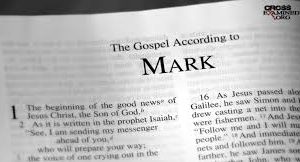A Reading Suggestion: The Gospel of Mark
This is the year of the Gospel of Mark. If you are a preacher who uses the Common Ecumenical Lectionary, or a member of a congregation that uses the Lectionary, you know this.
 Mark was the earliest of the four gospels to be written. And it is the shortest. You can read the whole thing in about an hour. Try it. Carve out an hour. Find a quiet place. Turn off the cell phone. And read The Gospel of Mark all the way through.
Mark was the earliest of the four gospels to be written. And it is the shortest. You can read the whole thing in about an hour. Try it. Carve out an hour. Find a quiet place. Turn off the cell phone. And read The Gospel of Mark all the way through.
When you read the whole thing you will notice stuff that you are likely to miss when you only hear the short, individual texts selected for each Sunday. For example, you will notice how terse Mark’s stories are. There’s not a lot of lengthy description or elaboration. It is all very tight. “Telescoped” is the term some scholars use for the way the stories in Mark are pared down to the barebones.
But this isn’t simply a style thing. It is part of Mark’s message about Jesus. What this characteristic style of Mark conveys is urgency and intensity. This is a very active Jesus who is here then there, doing this then doing that. He is on the move. In him, God is invading a world that is held captive by powers that distort, diminish and disfigure human life. Where Jesus is stuff happens. The invading Kingdom of God, in Mark, is not words but action (and words that are actions).
Thus one of the most frequently used words in the Gospel of Mark is “immediately.” As in Mark 1: 18, “And immediately they left their nets and followed him.” Or in 1:42, “Immediately the leprosy left him and he was made clean.” God is on the move: calling, healing, exorcizing. Jesus is battling the powers that hold humanity captive.
As noted above, when you only hear one brief reading or story at a time, on a given Sunday, this sense of urgency and immediacy tends to be lost. But if you read the entire Gospel in one sitting, it comes through, powerfully.
And, to be honest, “urgency,” “intensity,” are not the words most of us think of when we think “church.” Churches tend, often, toward just the opposite. There is little intensity or urgency. Too often, in an average Sunday service and sermon, it seems that not much is at stake. The Gospel of Mark, and the Jesus Mark portray, are a challenge to ecclesiastical lethargy and ho-hum-ness.
Take the reading for this coming Sunday, Mark 1: 14 – 20. In rapid fire succession, we hear that John the Baptist has been arrested, that Jesus has appeared proclaiming that the Kingdom of God is near, “Repent and believe in the Good News.” Then, boom!, in verse 16 – 20, Jesus quickly calls the first four disciples, Peter and Andrew, James and John. They leave nets, boat and father behind and follow him.
When you read this as part of the whole Gospel, you get that sense of urgency and intensity. If however you only read only this short lesson for Sunday something else often happens. The focus shifts, or drifts, onto the disciples themselves. The sense of urgency, of God’s activity, gives way (at least in my experience of bible studies on this passage) to considering the action of the disciples. “Gee, they left so much behind.” “How was this for their father?” Before long people are wondering, “Could I do that, would I do that — leave so much?” And then we’re off and talking about the amazing faith of the disciples, these great heroes of the faith who left it it all for Jesus. Nonsense!
That isn’t the point at all. I agree with Barbara Brown Taylor. These are not hero stories. They are miracle stories. They are stories “as full of God’s power as the feeding of the five thousand or the raising of the dead.” “This is no story,” continues Taylor, “about the power of human beings to change their lives, to leave everything behind and follow. This is a story about the power of God — to walk right up to a quartet of fishermen and work a miracle, creating faith where there was no faith, creating disciples where there were none just a moment before.”
So often in church we want to moralize everything, to turn it into a morality tale. Do this, not that. Be good, not bad. So here we focus on the disciples, their great faith, their heroism. Be like them. This is a subtle, or not so subtle, way of shifting the focus to ourselves. But in the biblical stories, it isn’t really all about us. It isn’t about you. It is about God. About a God who is doing things we don’t expect, can’t imagine nor explain.
If you do take me up on my reading suggestion and read the whole Gospel of Mark in one sitting, it is likely that this — the mysterious power and determined intrusion of God — is what will strike you. Drilling down on whether our faith is good enough, strong enough or heroic enough is not the point! The point is God, what God is up to, and God’s power to do a new and unexpected thing.
![Anthony B. Robinson [logo]](https://www.anthonybrobinson.com/wp-content/themes/anthonybrobinson/images/logo.png)
![Anthony B. Robinson [logo]](https://www.anthonybrobinson.com/wp-content/themes/anthonybrobinson/images/logo-print.png)